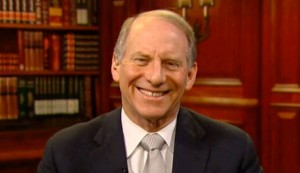The resigned laugh that says Dr Haass isn’t coming back…
Posted By: January 13, 2014
The resigned laugh that says Dr Haass isn’t coming back…
Richard Haass laughs off prospect of returning to Belfast during his interview for BBC
BY NOEL MCADAM . Belfast Telegraph. January 11, 2014
Richard Haass laughed loud – and just a little too long – when asked if he might come back to Northern Ireland to chair more talks.
The very suggestion that he and vice-chair Meghan O’Sullivan should return sent the senior diplomat into uncharact- eristic ripples of mirth.
While polite in tone, and carefully couching his message in the language of diplomacy, it was clear the senior US figure is more than a little irritated – even annoyed – with the response of politicians to his final report.
And he even – more undiplimatically – singled out theDUP, Ulster Unionists and Alliance for his displeasure.
His message is the parties have failed to show sufficient leadership and are in danger of allowing three of the most toxic topics at the heart of the political process – flags, parades and dealing with the legacy of the past – to fester and drift.
“Why three in particular were not prepared to endorse this agreement that, quite honestly, I and we feel gave them more than enough to go out and defend it, not to just the general public but to their own particular constituencies,” he told BBC NI’s The Viewprogramme.
“The two unionist parties and the Alliance were not prepared to sign on to the agreement, and I make it clear this was, if you will, collectively their agreement.
“This had been an agreement that all five parties worked on for six months and we had gone to enormous lengths to try to take into account their particular views, their concerns, their priorities and we thought we had done just that.”
The impression he appears to have gleaned from his experience here will not serve Northern Ireland well in the corridors of power in Washington.
From there, Vice-President Joe Biden was keeping a watching brief on the hothouse negotiations in the Stormont Hotel, and the White House was not long in voicing disappointment at the outcome.
It is perhaps unusual that, more than a week after the New Year deadline passed without agreement, Dr Haass is still pushing the parties and acting as chief persuader of the proposals contained in his seventh draft – from 3,000 miles away in New York.
But in the absence of any strong intervention from either the London or Dublin governments – so far, at least – this is a role which may fall to facilitators loath to give up on their peace-building project.
He and Harvard professor O’Sullivan first issued a terse statement in the middle of the week which implicitly rebuked the two unionist parties and Alliance by asking for a timetable to push on with the implementation of the last draft, also referred to as the “final text”.
It was a fairly dramatic intervention accusing the parties of being “unrealistic in the extreme” in expecting to get all they want.
And then, within 24 hours, they conducted a series of media interviews, including with the Belfast Telegraph, to underpin their message.
Dr Haass told UTV: “I also think that each party has more than enough in the agreement that they should be able to take the case to their respective constituents and make the case.
“There’s a lot in it for unionists, I believe there’s a lot in it for the members and supporters of Alliance, there’s a lot in it for nationalists and republicans.
“Most important, there’s a lot in it for Northern Ireland as a whole, as a society.”
There are some signs that Haass and O’Sullivan may be closer to the mood of the public here than their elected politicians.
The four main church leaders – Church of Ireland, Catholic, Presbyterian and Methodist – earlier in the week urged the parties to sustain the momentum of the Haass project and not give up on attempting to resolve some of the most contentious issues in the province.
And National Union of Students/Union of Students in Ireland presidentRebecca Hall said young people felt extremely let down. “The failure of the parties to agree a document at the Haass talks was deeply disappointing, and it’s very troubling that the situation appears to be descending into recrimination and farce,” she said.
“The fact that parties appear to be indulging in a blame game rather than trying to build on the progress made is nothing short of disgraceful.”
When Dr Haass was first approached and appointed by First MinisterPeter Robinson and Deputy First Minister Martin McGuinness, he revealed that stateside friends and colleagues had been surprised because they thought the problems in Northern Ireland had largely been sorted.
Anyone he has been talking to in the last week or so may have changed their opinion.
To be fair to Haass and O’Sullivan, it was pretty evident even as they wrapped up 15 days of intensive inter-party contact in the early hours of New Year’s Eve that their role in any future process would be a limited one.
Even their body language showed they had given us their best shot.











